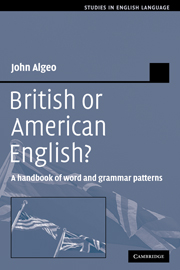Book contents
- Frontmatter
- Contents
- Preface
- Acknowledgments
- Introduction
- Part I Parts of Speech
- 1 Verbs
- 2 Determiners
- 3 Nouns
- 4 Pronouns
- 5 Adjectives
- 6 Adverbs
- 7 Qualifiers
- 8 Prepositions
- 9 Conjunctions
- 10 Interjections
- Part II Syntactic Constructions
- Bibliography of British book citation sources
- Bibliography of studies, dictionaries, and corpora
- Index of words
- Frontmatter
- Contents
- Preface
- Acknowledgments
- Introduction
- Part I Parts of Speech
- 1 Verbs
- 2 Determiners
- 3 Nouns
- 4 Pronouns
- 5 Adjectives
- 6 Adverbs
- 7 Qualifiers
- 8 Prepositions
- 9 Conjunctions
- 10 Interjections
- Part II Syntactic Constructions
- Bibliography of British book citation sources
- Bibliography of studies, dictionaries, and corpora
- Index of words
Summary
Qualifiers (also called degree adverbs) are expressions that modify adjectival or adverbial constructions. They seem to be more frequently used in British than in American, a generalization that is statistically supported for quite and very according to the LOB and Brown corpora. On the other hand, some qualifiers are characteristic of American, such as kind of in The argument waskind ofcompelling, mighty in It'smightyhot today, plenty in The nights wereplentycold (a MW usage note points out that, despite advice against the use, it is more precise in some contexts than the alternatives, although it is informal), and some in He's feelingsomebetter today. Other qualifiers identified as primarily American are pretty, real, really, so, and totally (LGSWE 564–7).
Modifying adjectives or adverbs
(a) bit A little; rather: CIC has 1833.7 iptmw in British texts and 670.7 in American texts. <After the judge had said he hoped that the women would “be able to arrive at some sort of truce”, Lady Archer, 58, remarked to her solicitor: “That's a bit rich.”> 2003 July 4 Times 7/1.
absolutely <How absolutely super!> 1985 Mortimer 229. Cf. LGSWE 564.
as near as makes no difference/matter/odds Very nearly: CIC has no American tokens but a number of British ones. <There are new options. These are mostly based upon the realisation, which has come upon the Irish like a cloudburst at a race meeting, that the country is as near as makes no odds bankrupt.> 1987 Feb. 9 Evening Standard 7/2.
at all Very in a negative context <He didn't feel he knew either at all well.> 1983 Innes 55.
[…]
- Type
- Chapter
- Information
- British or American English?A Handbook of Word and Grammar Patterns, pp. 153 - 158Publisher: Cambridge University PressPrint publication year: 2006

